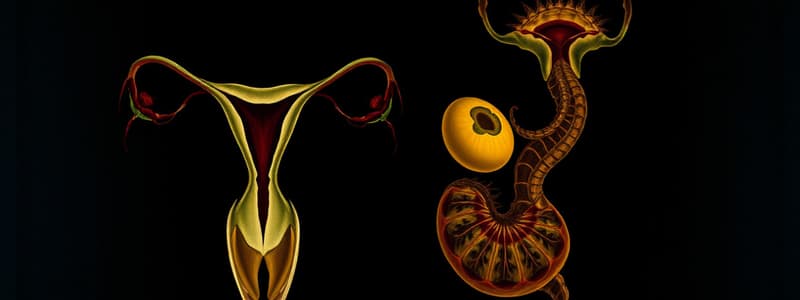Podcast
Questions and Answers
What type of cells do dyads refer to?
What type of cells do dyads refer to?
- One diploid daughter cell
- Both (correct)
- Four haploid daughter cells
- None of the above
Which process results in tetrads being visible?
Which process results in tetrads being visible?
- Mitosis
- Meiosis (correct)
- Both
- None of the above
The product of mitosis is:
The product of mitosis is:
- One diploid daughter cell
- Two diploid daughter cells genetically identical to the mother cell (correct)
- Four haploid daughter cells
- None of the above
Which of the following describes the product of meiosis?
Which of the following describes the product of meiosis?
The phases of prophase, metaphase, anaphase, and telophase are involved in which process?
The phases of prophase, metaphase, anaphase, and telophase are involved in which process?
What do dyads represent in terms of visibility?
What do dyads represent in terms of visibility?
What process involves tetrads being visible?
What process involves tetrads being visible?
What is the product of mitosis?
What is the product of mitosis?
What does meiosis produce?
What does meiosis produce?
Which processes involve the phases prophase, metaphase, anaphase, and telophase?
Which processes involve the phases prophase, metaphase, anaphase, and telophase?
Where does mitosis occur?
Where does mitosis occur?
Where does meiosis occur?
Where does meiosis occur?
What is the main purpose of mitosis?
What is the main purpose of mitosis?
What do homologous chromosomes do during meiosis?
What do homologous chromosomes do during meiosis?
What is the significance of crossover in daughter cells?
What is the significance of crossover in daughter cells?
What are homologous chromosomes?
What are homologous chromosomes?
What is a primitive stem cell in males?
What is a primitive stem cell in males?
What are the products of meiosis II?
What are the products of meiosis II?
What is a sperm?
What is a sperm?
Why are spermatids considered non-functional gametes?
Why are spermatids considered non-functional gametes?
Why is the lifespan of sperm short?
Why is the lifespan of sperm short?
What are follicles?
What are follicles?
How are primary and vesicular follicles anatomically different?
How are primary and vesicular follicles anatomically different?
What is a corpus luteum?
What is a corpus luteum?
What hormone is primarily produced by the vesicular follicle?
What hormone is primarily produced by the vesicular follicle?
What is the fate of the three tiny cells produced during oogenesis?
What is the fate of the three tiny cells produced during oogenesis?
What hormone is produced by primary follicles in the ovary?
What hormone is produced by primary follicles in the ovary?
What hormone is released after ovulation?
What hormone is released after ovulation?
Which hormones exert negative feedback on the anterior pituitary relative to FSH secretion?
Which hormones exert negative feedback on the anterior pituitary relative to FSH secretion?
What stimulates LH release by the anterior pituitary?
What stimulates LH release by the anterior pituitary?
What stimulates the corpus luteum to produce progesterone and estrogen?
What stimulates the corpus luteum to produce progesterone and estrogen?
What maintains the hormonal production of the corpus luteum in a nonpregnant woman?
What maintains the hormonal production of the corpus luteum in a nonpregnant woman?
Why does the corpus luteum deteriorate toward the end of the ovarian cycle?
Why does the corpus luteum deteriorate toward the end of the ovarian cycle?
What uterine tissue undergoes dramatic changes during the menstrual cycle?
What uterine tissue undergoes dramatic changes during the menstrual cycle?
Flashcards are hidden until you start studying
Study Notes
Mitosis vs. Meiosis
- Dyads form during meiosis, indicating the pairing of homologous chromosomes.
- Tetrads are visible in meiosis, crucial for genetic variability.
- Mitosis produces two diploid daughter cells that are genetically identical to the mother cell.
- Meiosis results in four haploid daughter cells that differ from the mother cell both quantitatively and qualitatively.
- Both processes include phases: prophase, metaphase, anaphase, and telophase.
- Mitosis occurs throughout the body, while meiosis is confined to the ovaries and testes.
Functions of Mitosis and Meiosis
- Mitosis provides cells for growth and repair of tissues.
- Meiosis is essential for the perpetuation of the species by producing gametes.
- Meiosis involves two consecutive nuclear divisions without chromosomal replication before the second division.
Synapsis and Genetic Variability
- Synapsis is the pairing of homologous chromosomes, facilitating genetic recombination.
- Crossover events during meiosis introduce variability as homologous chromosomes exchange genetic material.
Germ Cells and Gametes
- Homologous chromosomes include one paternal and one maternal chromosome carrying genes for the same traits.
- Spermatogonium serves as a primitive stem cell for sperm production.
- Secondary spermatocycles, spermatids, and sperm are haploid stages in sperm development.
- Sustentocytes provide nutrients to developing sperm.
Oogenesis and Follicle Development
- Oogenesis results in one ovum and three polar bodies, the latter deteriorating post-formation.
- Follicles are sac-like structures in the ovaries containing germ cells.
- Primary follicles consist of a few surrounding cells, while vesicular follicles contain a large antrum with fluid.
Hormonal Regulation
- The major hormone produced by vesicular follicles is estrogen.
- The corpus luteum produces progesterone and some estrogen after ovulation.
- Negative feedback on the anterior pituitary inhibiting FSH comes from estrogen and progesterone; Luteinizing hormone (LH) stimulates the corpus luteum.
Menstrual Cycle Changes
- The endometrium undergoes significant changes during the menstrual cycle, impacting fertility.
- The deterioration of the corpus luteum at the end of the ovarian cycle occurs due to low levels of LH from the anterior pituitary.
Studying That Suits You
Use AI to generate personalized quizzes and flashcards to suit your learning preferences.




